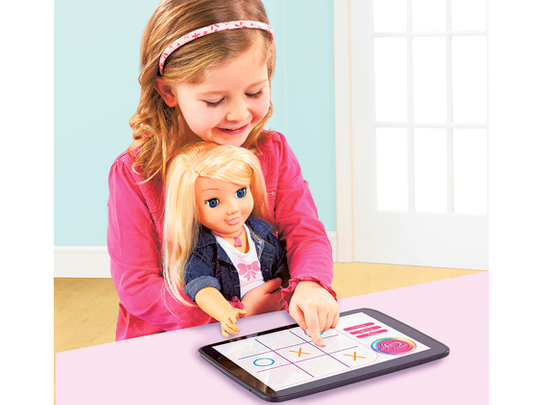
Dubai: It’s not unusual for parents to think twice about buying items that catch their children’s fancy when visiting toy stores. But the upcoming launch in the UAE of a new intelligent doll that connects wirelessly to the internet is pushing anxiety levels among parents a few notches higher given perceived concerns about the long-term impact of such a toy on children.
Although many children who have heard about the smart interactive doll ‘My friend Cayla’ can’t wait to get their hands on it once it arrives in stores some time in September, many parents in the UAE find themselves in a dilemma given the perception that such a toy may lead to social isolation among children.
The 18-inch-tall doll, manufactured by UK-based Vivid, is the world’s first intelligent doll that connects to the internet using Bluetooth via smartphone or tablet, and is able to have real conversations with kids using speech-to-text technology. Employing technology that’s almost similar to the Siri application in Apple devices, it uses google voice recognition to find answers. It can also tell stories, play games with children, and can answer questions about her personality, family, or friends, and even solve math problems.
Gulf News spoke to parents in the UAE about their opinions regarding the new internet-enabled toy and whether they plan on getting it for their children or not.
Nicole Buergi, a mother of two young girls aged 9 and 11, says she wouldn’t buy a doll like Cayla because she would rather have her children speak with other children their age than buying a doll that speaks with them.
“This doll is going to isolate them, because it’s not a real person that they are talking to and it can’t be a real friend to them. If they have a real problem and they decide to tell the doll, the doll will not be able to find a solution for them,” Buergi said.
Buergi also said that a child’s attachment to the doll would turn out to be a big problem because children would prefer to seek advice from the doll instead of their parents and depend on such advice.
Tasneem Ajaj, co-founder and director of Orange Tree children’s nursery and a mother of three children, said that she wouldn’t purchase toys like these because she feels it hinders the socialisation process of children.
“I believe kids need to have as much real interaction with their peers and parents at this stage more than interacting with dolls. In the nursery for example, we try to limit interactive toys because we feel children are already exposed to many at home,” she said.
Some parents like Heide Keld, a mother of two, said that she has no problem getting Cayla for her children, even though most parents wouldn’t. However, she believes that if a child is already predisposed to a particular toy, it can be a problem.
“The only problem associated with such dolls is that it would stop a child’s imaginative response. Instead of responding to their own imagination, the doll does all the responding for them. Also, If a child already has a problem with separating reality from fantasy, then parents shouldn’t be buying their children toys like that,” she said.
Dr Rebecca Steingiesser, a clinical psychologist and clinical neuropsychologist at Light House Arabia, says that there are several consequences associated with engagement and attachment to talking toys.
“Firstly, there is a risk that the child may misappropriate the doll as an indicator of what a ‘real’ friend should be like. Further, engagement with robotic dolls such as this prevents children from learning proper social cues and behavioural appropriateness that is fostered through face-to-face engagement with other children.
“Additionally, children do not develop the capacity for empathy to the extent that it is necessary to be a functional and adaptive member of society. A child will not learn the consequences of what it means to hurt another person’s feelings, as a doll does not have feelings.
“It is also easy for a child to walk away from the doll if the engagement is no longer satisfying and does not allow a child to learn the appropriate methods of conflict management, frustration tolerance or patience,” she said.
Steingiesser said that this may also lead children to relate to the world around them in a very unidimensional manner “as they may begin to lack the ability to develop appropriate non-verbal social skills, regulate their responses to the unpredictable behaviour of others and challenging social experiences and to empathise with others through perspective taking”.
Maud Patocco, marketing manager of Atiq Liussie, the UAE-based toy trader and distributor of Cayla, told Gulf News that connected toys do scare parents most of the time, but that there are benefits of owning the toy.
“We understand very well the parent concern about Cayla, but they should know that Cayla has been created to allow the child to have an active attitude even if the doll can talk, read stories, and answer questions. The topics and story themes are created to develop the child’s knowledge,” he said.
Steingiesser advises parents who plan on buying this doll for their children to supervise the hours their children play with this doll and to not use the doll as “a replacement for human contact, or as an extra caregiver.”












